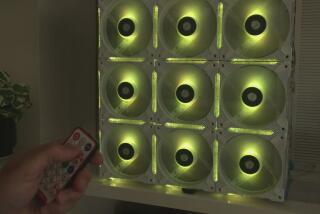Detroit Families to Get Free Vacuums
WASHINGTON — Federal researchers soon will provide state-of-the-art vacuum cleaners to 50 families in Detroit who have asthmatic children ages 7 to 11, the National Institute of Environmental Health Sciences announced Thursday.
The rare attempt to use household goods in the name of science--most federal research money is spent to study drug effects--is an effort to confirm what experts and parents long have believed: that household allergens, such as dust mites and cat dander, can trigger potentially serious asthma attacks.
For the record:
12:00 a.m. July 1, 2000 For the Record
Los Angeles Times Saturday July 1, 2000 Home Edition Part A Part A Page 5 National Desk 2 inches; 37 words Type of Material: Correction
Asthma study--A story in The Times on Friday incorrectly reported that 50 vacuum cleaners would be distributed to families in Detroit in a government-funded study of whether use of the appliances could reduce childhood asthma attacks. The correct number is 150.
The study, sponsored by the Environmental Health Sciences Institute (part of the National Institutes of Health) and the Environmental Protection Agency, will examine whether using everyday items--not just vacuum cleaners, but plastic mattress covers and pillowcase covers--can improve childhood asthma.
Numerous studies have found that dust mites can lead to the development of asthma in susceptible people and that mites, cockroaches, pet dander, tobacco smoke and other indoor substances can worsen symptoms in those who already have the disease.
Asthma has become a worsening health problem, with a 75% increase in the disease since 1980, especially among African American children and those living in poor neighborhoods.
An estimated 17.3 million Americans suffer from asthma, according to the federal Centers for Disease Control and Prevention. More than 80% of the cases develop in early childhood.
Asthma is the most common chronic illness among American children and is the seventh most chronic ailment overall in the country, according to the American Lung Assn. The disease leaves its victims coughing, wheezing and gasping for air.
The $5-million, five-year study will be conducted in the east and southwest areas of Detroit and eventually will involve more than 300 families with asthmatic children. The first group will receive the vacuum cleaners soon. The second group will get them next spring.
The study is being run locally by several agencies and organizations working with the University of Michigan.
“Vacuuming--with the right kind of filters--can help rid the house of things that can trigger asthma symptoms,” said Dr. Randy Brown, a pediatric pulmonologist working with the local groups in Detroit.
The devices have specially equipped filters “to really get as much of the allergens out of there as possible,” said John Peterson, a spokesman for the Environmental Health Sciences Institute.
The study will require regular home visits by community environmental specialists or outreach workers and will track allergens in the homes and asthma attacks. The group also will study the families’ exposure to other air pollutants.
“The families are eager to work with us, both to help the children and to help their community,” said Jean Patton, a Detroit community environmental specialist.
Rose Smith, whose child is in the study, said: “I like the project very much. It has helped me to learn more about asthma and how to control it.”
And Alex Allen, director of the Butzel Family Center, one of the local organizations involved, said it is “a great project because participants benefit from not only the asthma-related information and feedback, but the environmental specialists try to address other problems that may plague the family--like the lack of health insurance, employment or housing.”






